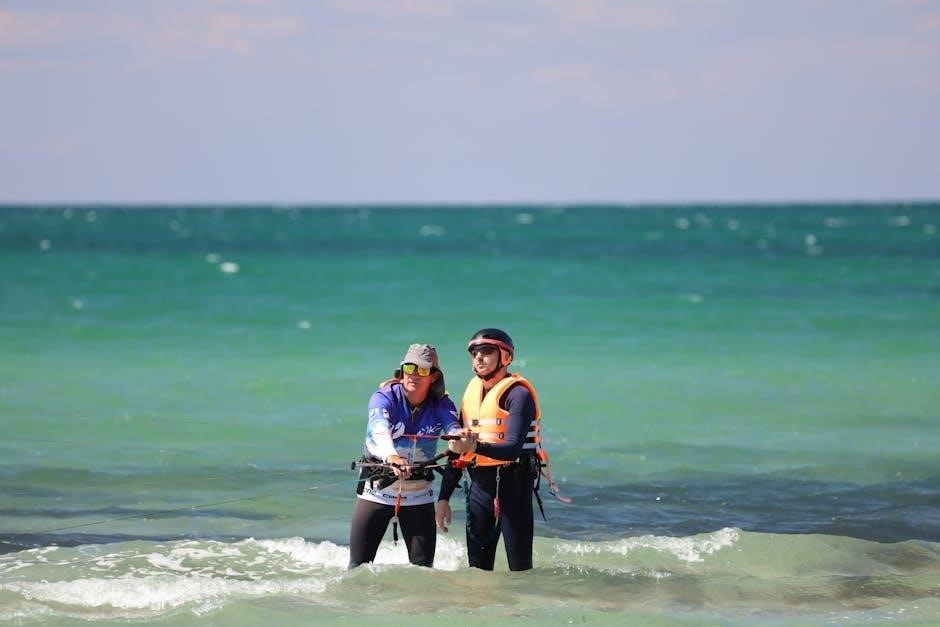the ultimate human guide to water fasting

Water fasting is a practice where only water is consumed for 24–72 hours, promoting physical and mental rejuvenation. It’s gaining popularity for its potential health benefits.
1.1 What is Water Fasting?
Water fasting is a fasting method where individuals consume only water for a specified period, typically ranging from 24 to 72 hours. During this time, no food or other beverages are allowed, allowing the body to rely on stored fat for energy. This practice is often undertaken for its potential health benefits, such as detoxification, weight loss, and improved mental clarity. It is essential to note that water fasting should not exceed 72 hours without medical supervision. The simplicity of this fasting method makes it accessible to many, though it requires discipline and preparation to ensure safety and effectiveness.
1.2 Importance of Water Fasting
Water fasting holds significant importance as a holistic health practice, promoting physical cleansing and mental renewal. By abstaining from food, the body focuses on detoxification, utilizing stored fat for energy. This process can enhance metabolic efficiency and support weight loss. Additionally, water fasting is believed to improve mental clarity and reduce inflammation, potentially lowering the risk of chronic diseases. It also fosters self-discipline and mindfulness, encouraging a deeper connection with one’s body. Many practitioners value its ability to reset eating habits and improve overall well-being. However, it’s crucial to approach water fasting responsibly, ensuring it aligns with individual health goals and is practiced safely within recommended durations.

Benefits of Water Fasting
Water fasting promotes detoxification, boosts human growth hormone levels for healing, and enhances autophagy, supporting overall health and longevity.
2.1 Physical Benefits
Water fasting offers numerous physical benefits, including detoxification, improved metabolic function, and increased human growth hormone production; It promotes autophagy, where the body repairs and recycles damaged cells, enhancing longevity. Fasting also supports weight loss by utilizing stored fat for energy, lowering blood pressure, and improving insulin sensitivity, reducing the risk of chronic diseases like diabetes and heart disease. Additionally, it can enhance immune function by stimulating the regeneration of immune cells. Overall, water fasting can lead to a rejuvenated and healthier physical state when done safely and under proper guidance.
2.2 Mental and Emotional Benefits
Water fasting can lead to significant mental and emotional improvements, such as increased clarity of mind, reduced stress, and enhanced self-discipline. Many people report feeling a sense of purpose and focus as they commit to the fasting process. It also promotes emotional resilience by teaching individuals to manage hunger and cravings, fostering a stronger connection between the mind and body. Additionally, fasting can reduce anxiety and depression by lowering cortisol levels and increasing the production of neurotransmitters like serotonin and dopamine. The mental challenge of fasting often leads to personal growth, boosting confidence and self-awareness. Overall, water fasting can be a transformative experience for both the mind and spirit, helping individuals develop greater emotional stability and inner peace.
2.3 Science Behind the Benefits
Water fasting triggers several physiological processes that contribute to its benefits. One key mechanism is the increase in human growth hormone (HGH), which promotes cellular repair and metabolism. Fasting also induces autophagy, a natural cleansing process where the body breaks down and recycles damaged cells and proteins. Additionally, water fasting enhances the immune system by stimulating the production of white blood cells, which helps combat infections. The body shifts into a state of ketosis, burning stored fat for energy, which can improve metabolic efficiency. These biological changes are supported by studies showing improved insulin sensitivity, reduced inflammation, and enhanced cellular health. The science underscores how fasting can reboot and optimize various bodily functions, leading to overall well-being.

Preparation for Water Fasting
Preparation involves consulting a healthcare provider, setting clear goals, and gradually adjusting your diet to minimize withdrawal symptoms and prepare your body for fasting.
3.1 Consulting a Healthcare Provider
Consulting a healthcare provider is crucial before starting a water fast. They assess your health status, identify risks, and provide personalized guidance, ensuring safety and suitability for fasting.
3;2 Setting Clear Goals
Setting clear goals is essential for a successful water fast. Whether it’s improving health, detoxifying, or enhancing mental clarity, having defined objectives helps maintain focus and motivation throughout the fasting period. Determine the duration and purpose to align expectations with outcomes, ensuring a structured approach. Clear goals also aid in tracking progress and staying committed, especially when challenges arise during fasting. Establishing measurable targets allows individuals to evaluate their achievements post-fast, reinforcing the benefits of this practice. A well-defined plan ensures the fasting experience is meaningful and fulfilling, aligning with personal health aspirations. This clarity strengthens resolve and maximizes the potential benefits of water fasting. Goals should be realistic and attainable, avoiding overly ambitious targets that may lead to discouragement. By setting specific intentions, individuals can better navigate the fasting journey and achieve their desired outcomes successfully. Additionally, clear goals help in preparing mentally and emotionally, making the fasting process more manageable and impactful. They serve as a guiding force, keeping individuals focused on their priorities and committed to their health objectives. Ultimately, well-set goals enhance the overall effectiveness of water fasting, making it a transformative experience for those who undertake it.
3.3 Pre-Fast Diet and Routine
A proper pre-fast diet and routine are crucial for a smooth transition into water fasting. It’s recommended to gradually reduce calorie intake and avoid heavy, rich, or processed foods 1–3 days before starting. Focus on consuming fruits, vegetables, lean proteins, and whole grains to prepare the body. Staying hydrated is also essential, as it helps flush out toxins and eases the fasting process. Avoid stimulants like caffeine and alcohol, as they can cause unnecessary stress during fasting. Establishing a consistent daily routine, including light exercise and mindfulness practices, can mentally and physically prepare the body. A well-planned pre-fast routine ensures the body is in optimal condition, reducing potential discomfort and enhancing the fasting experience. This preparation also helps minimize cravings and supports a successful fast.

What to Expect During Water Fasting
During water fasting, expect initial hunger and fatigue, followed by increased energy and mental clarity. The body adapts, and human growth hormone levels may rise, aiding healing.
4.1 Physical Changes and Symptoms
During water fasting, individuals may experience physical changes such as hunger, fatigue, and dizziness. The body initially uses stored glucose, leading to potential lightheadedness. As the fast progresses, the body shifts to burning fat, which can stabilize energy levels. Some people report experiencing a detox phase, characterized by headaches or nausea. These symptoms typically subside within the first 48 hours. Additionally, fasting can lead to increased autophagy, a natural process where the body repairs and recycles cells, promoting overall health. It’s important to monitor these changes and ensure proper hydration to support the body’s adaptation. Rest and hydration are key to managing these symptoms effectively during the fasting period.
4.2 Emotional and Psychological Challenges
Water fasting can present significant emotional and psychological challenges. Many individuals experience irritability, anxiety, or mood swings, particularly in the initial stages. Hunger pangs and cravings can trigger emotional responses, making it difficult to stay focused. Additionally, the mental discipline required to abstain from food can lead to feelings of deprivation or frustration. Some people may also encounter fear or anxiety about hunger, which can intensify as the fast progresses. However, these challenges often subside as the body adapts, and many report heightened mental clarity and emotional resilience afterward. Staying positive, setting realistic expectations, and engaging in mindfulness practices can help mitigate these psychological hurdles and enhance the overall fasting experience.
4.3 Social and Environmental Challenges
Water fasting often presents social challenges, as it requires abstaining from food in environments where eating is common. Social gatherings, meals with family or friends, and workplace lunches can become difficult to navigate, leading to feelings of isolation or awkwardness. Additionally, societal norms and expectations around food can create pressure, making it hard to adhere to a fasting regimen. Environmental factors, such as easy access to food or distracting smells, can also hinder progress. Furthermore, lack of understanding or support from others may lead to criticism or skepticism, adding emotional strain. To overcome these challenges, it’s essential to communicate intentions clearly, seek supportive communities, and prepare strategies for handling social situations while fasting.

Maintaining Health During Water Fasting
Monitor vital signs, stay hydrated, and balance electrolytes to ensure safety and well-being during your fast. Regular check-ins with a healthcare provider are crucial for maintaining optimal health.
5.1 Monitoring Vital Signs and Health Markers
Regularly monitoring vital signs, such as heart rate, blood pressure, and body temperature, is essential during water fasting to ensure safety and detect potential issues early. Additionally, tracking health markers like electrolyte levels, blood glucose, and hydration status can help prevent complications. It’s important to maintain proper electrolyte balance by adding a pinch of unrefined sea salt to water if needed. Monitoring these markers ensures the body remains in a stable state, preventing dehydration or nutrient deficiencies. Consulting a healthcare provider for guidance on what to monitor and how often is crucial, especially for those with pre-existing health conditions. This proactive approach helps maintain overall well-being and addresses any concerns promptly.
5.2 Staying Hydrated and Electrolyte Balance
Staying hydrated is crucial during water fasting, as it helps flush toxins and maintains bodily functions. Drinking plenty of water ensures the body remains hydrated, preventing dehydration-related complications. Additionally, maintaining electrolyte balance is vital, as fasting can deplete essential minerals like sodium, potassium, and magnesium. Electrolytes regulate water balance, nerve function, and muscle contractions. To replenish them, some people add a pinch of unrefined sea salt to their water; Proper hydration and electrolyte balance prevent dizziness, muscle cramps, and other symptoms. Monitoring these levels and adjusting as needed ensures a safer and more comfortable fasting experience. Consulting a healthcare provider for personalized advice is recommended, especially for extended fasts or specific health conditions.

Mental and Emotional Aspects
Water fasting enhances mental clarity, boosts willpower, and fosters emotional resilience. It reduces stress and anxiety while promoting mindfulness and self-awareness, aiding in personal growth and introspection.
6.1 Strategies for Staying Motivated
Staying motivated during a water fast requires setting clear goals and maintaining a positive mindset. Visualization techniques can help you focus on the benefits, such as improved health and increased energy. Sharing your fasting journey with a supportive community or partner can provide encouragement and accountability. Additionally, engaging in light physical activities like yoga or walking can boost your mood and keep your mind occupied. Reminding yourself of the purpose behind your fast, whether it’s for health, spiritual growth, or self-discipline, can reignite your motivation during challenging moments. Celebrating small milestones, like completing each day, also helps maintain momentum and reinforces your commitment to the process.
6.2 Managing Hunger and Cravings Effectively
Managing hunger and cravings during water fasting requires a combination of mindset shifts and practical strategies. Staying hydrated by drinking plenty of water can help reduce hunger pangs, as thirst is often mistaken for hunger. Incorporating electrolytes, such as a pinch of sea salt in water, can stabilize energy levels and curb cravings. Distracting yourself with activities like reading, journaling, or light exercise can divert your focus from hunger. Practicing deep breathing and mindfulness can also help you stay calm and centered when cravings arise. Setting small, achievable goals and celebrating milestones can boost motivation. Finally, remind yourself that hunger is temporary and part of the fasting process, reinforcing your commitment to your health and well-being.

Safety Considerations
Water fasting is generally safe for 24–72 hours, but longer periods require medical supervision. Consult a healthcare provider, especially if you have health conditions or take medications. Risks include dehydration and electrolyte imbalance, so monitoring vital signs is crucial. Certain groups, like pregnant women or those with chronic illnesses, should avoid fasting. Listen to your body and stop if severe symptoms arise, such as dizziness or chest pain. Prioritize your health and safety above fasting goals.
7.1 Who Should Avoid Water Fasting
Water fasting may not be suitable for everyone. Individuals with chronic diseases, such as diabetes or heart conditions, should avoid fasting without medical supervision. Pregnant or breastfeeding women, children, and those with a low BMI or history of eating disorders should not fast. People taking certain medications or with compromised immune systems also need to exercise caution. Additionally, those with a history of malnutrition or severe health conditions should avoid fasting. It’s crucial to consult a healthcare provider before starting a water fast, especially if you have any underlying health issues. Fasting can exacerbate existing health problems if not approached carefully.
7.2 Signs Indicating It’s Time to Stop
If you experience severe dizziness, fainting, or extreme fatigue during a water fast, it’s a clear sign to stop. Persistent nausea, vomiting, or abdominal pain may indicate your body is struggling to cope. Significant drops in blood pressure or irregular heartbeats are also concerning symptoms. If you notice confusion, disorientation, or severe mental fogginess, it’s time to break the fast. Additionally, if you develop dehydration symptoms, such as dry mouth, dark urine, or excessive thirst, despite drinking water, you should stop fasting. Consulting a healthcare provider immediately is crucial if any of these signs arise, as they may signal serious health risks.

Tips for Successful Water Fasting
Plan your fast, stay hydrated, and monitor electrolytes. Listen to your body, rest when needed, and avoid strenuous activities. Keep a journal to track progress and emotions.
8.1 Creating a Realistic Schedule
Creating a realistic schedule is crucial for a successful water fast. Start with a timeframe that aligns with your lifestyle and health goals—beginners may opt for a 24-hour fast, while experienced individuals might aim for 72 hours. Consider your daily commitments and ensure you can rest and avoid strenuous activities. Plan the start and end times carefully, ideally beginning on a weekend or day off. Setting a clear schedule helps maintain discipline and reduces the likelihood of abrupt interruptions. Additionally, inform a trusted friend or family member about your fasting plan for support and accountability. A well-structured schedule enhances the fasting experience and ensures safety.
8.2 Keeping Yourself Occupied and Engaged
Keeping yourself occupied and engaged is essential during a water fast to maintain focus and reduce hunger pangs. Engage in light physical activities like yoga or walking to stay active without exertion. Dedicate time to hobbies such as reading, journaling, or painting to keep your mind stimulated. Meditation and deep breathing exercises can also help you stay centered and calm. Staying hydrated by sipping water throughout the day is important to prevent dehydration. Additionally, connect with others through support groups or online communities to share experiences and gain motivation. A busy and structured routine helps make the fasting period more manageable and fulfilling.

Ending the Water Fast
Ending a water fast requires careful planning to reintroduce food gradually. Start with small, bland meals to ease digestion and avoid shocking your system.
9.1 Safe Steps to Break the Fast
Breaking a water fast safely is crucial to avoid digestive discomfort or health risks. Start with small portions of bland, easily digestible foods like steamed vegetables, broth, or fruits. Avoid heavy meals initially to prevent shocking your system. Monitor your body’s reactions, and if nausea or dizziness occurs, pause and reassess. Gradually introduce complex foods over several meals to restore your digestive balance. Consulting a healthcare provider, especially after prolonged fasting, ensures a smooth transition. Proper rehydration and electrolyte balance should continue during this phase to support recovery and overall well-being.
9.2 Post-Fast Nutrition and Meal Planning
After breaking your fast, focus on nutrient-dense, whole foods to replenish your body. Incorporate lean proteins, whole grains, and a variety of colorful vegetables to restore energy and nutrients. Avoid processed foods and sugars initially, as they can cause digestive upset. Meal planning should emphasize balance, ensuring adequate vitamins, minerals, and fiber. Consider introducing probiotic-rich foods like yogurt or kefir to support gut health. Listen to your body and adjust your diet based on how you feel. A gradual and mindful approach to eating post-fast helps maintain the benefits of fasting and supports long-term wellness. Proper nutrition planning is key to a successful transition back to regular eating habits.

Common Misconceptions
Many believe water fasting is harmful or leads to muscle loss, but these are myths. It’s not for everyone, emphasizing the need for awareness and caution.
10.1 Myths About Water Fasting
One common myth is that water fasting leads to muscle loss. However, research shows that the body prioritizes fat stores over muscle during fasting periods. Another misconception is that fasting is harmful to everyone. While it’s true that certain individuals, such as those with specific health conditions, should avoid fasting, many people can safely fast under proper guidance. Some believe that fasting slows metabolism, but studies indicate that metabolism remains relatively stable during short-term fasts. Additionally, the idea that fasting weakens the immune system is unfounded; in fact, fasting can enhance immune function by promoting cellular cleansing. Understanding these myths helps individuals make informed decisions about water fasting.
10.2 Separating Fact from Fiction
While water fasting has gained popularity, it’s important to distinguish fact from fiction. One common misconception is that fasting is dangerous or unhealthy for everyone. In reality, for most people, short-term water fasting (24–72 hours) is safe and can be beneficial when done correctly. Scientific studies support its ability to improve insulin sensitivity, promote autophagy, and enhance fat metabolism. Another myth is that fasting leads to nutrient deficiencies, but this is typically not the case during short fasts. However, prolonged fasting without medical supervision can pose risks. It’s also untrue that fasting is only for detoxification; its benefits extend to mental clarity, reduced inflammation, and cellular repair. By understanding the science and consulting professionals, individuals can make informed decisions about water fasting.





